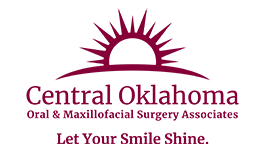Post-Surgical Care Dental Implants
You have had a surgical operation and a certain amount of pain, swelling and bleeding is to be expected. Everyone in this office is interested in your comfort and speedy recovery. Please cooperate with us by following these instructions.
BLEEDING
A certain amount of bleeding is to be expected following the removal of teeth and it may continue for several hours. You should place a moistened gauze roll directly on the bleeding site and apply pressure for 30 minutes. Repeat as often as necessary every 30 minutes until bleeding subsides. Slight oozing the first 24 hours is acceptable. To help control bleeding, DO NOT rinse your mouth the first day. A small, dry tea bag may be alternated with the gauze for extra clotting effect. In case of severe or heavy bleeding, call our office, (405) 624-1300.
SWELLING
Swelling usually occurs following surgery. An ice bag applied alternately to the right and left side, for 20 minutes on each side for the first 6 – 9 hours after surgery will help, but will not eliminate swelling. After the first day DO NOT use the ice. You may apply warm, moist heat after the first 24 hours.
SINUS PRECAUTIONS
After a sinus graft, do not blow your nose or sneeze. It is also helpful to take an over the counter decongestant like Sudafed or Actifed for seven days as directed on the package. It is also normal to have a bloody, granulated discharge from your nose for a few days following your surgery.
ORAL HYGIENE
After the first 24 hours, begin rinsing your mouth twice a day with Peridex. Rinse with 1⁄2 ounce undiluted for 30 seconds. Do not swallow. Continue using the Peridex until gone. You may resume gentle tooth brushing on the day after your surgery to all areas except the implant surgical site. Clean this area with Q-tips and Peridex only for approximately 10-14 days. Do not wear your partial, complete or temporary denture until your doctor has instructed you to do so.
PAIN
before the local anesthesia wears off completely. While you are taking your prescription pain medication, DO NOT drive or operate any type of heavy machinery. Also, you will have less discomfort if you rest with your head elevated or remain in a semi-reclining position.
NAUSEA
Post-operative nausea is usually caused by taking medication on an empty stomach. Occasionally people experience nausea from different pain medications. If nausea occurs, discontinue the pain pills. Tylenol or Ibuprofen (Advil, etc.) can be used until your prescription can be changed. Avoid milk products until the nausea subsides.
FOOD
Begin with clear liquids such as Sprite or 7-Up and then advance to soft foods: soup, pudding, gelatin, oatmeal, applesauce, baked potatoes, pasta, etc. It is very important that you drink plenty of fluids. Also, avoid tobacco products and alcoholic beverages for 5 – 7 days.
ACTIVITY
There are no set of rules because people recover at different rates. Take it easy for the first few days, then be reasonable; don’t push yourself. Remember, while you are taking your prescription pain medication, DO NOT drive or operate any heavy machinery and avoid any other activities in which you may injure yourself.
